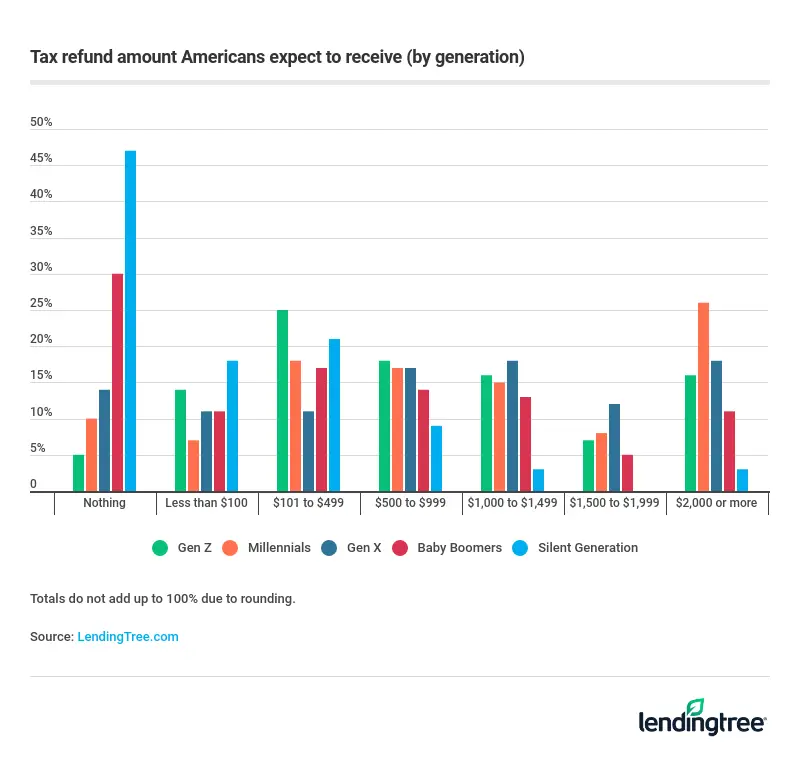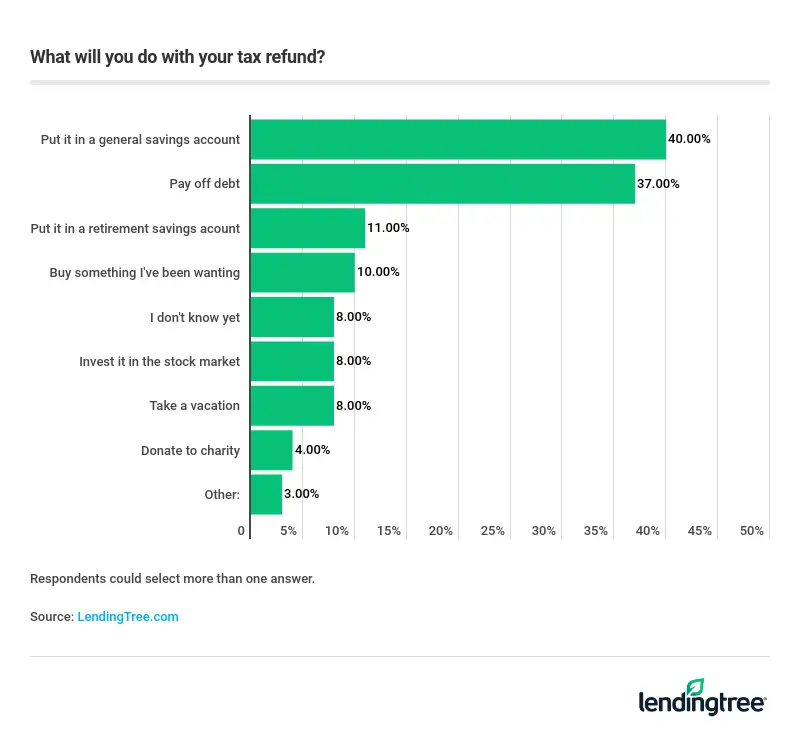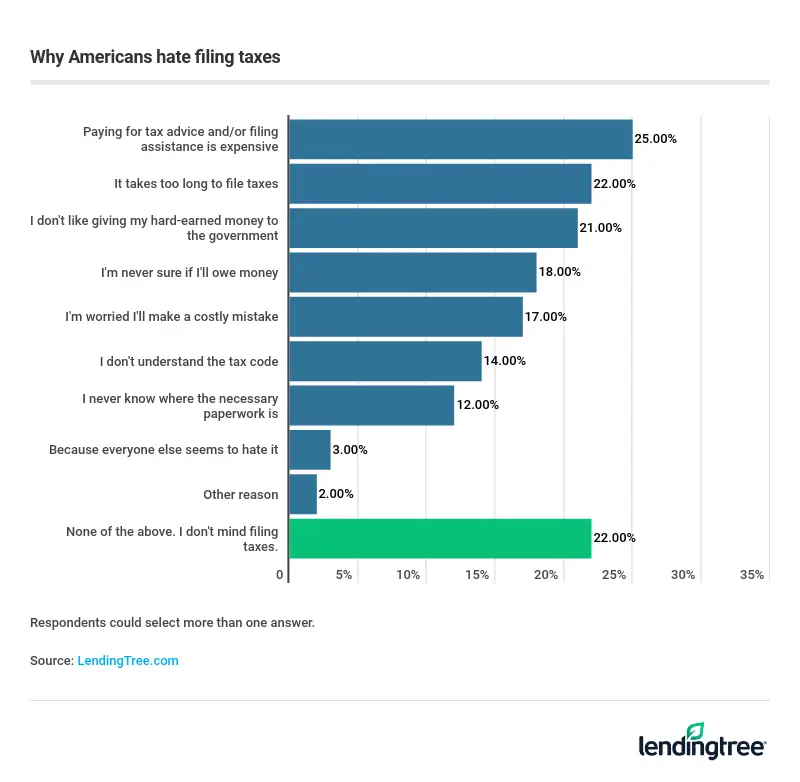Most Americans Dread Doing Their Taxes, But 4 in 10 Rely on Refunds
Depending on whether you expect to get a tax return, tax season can feel like a blessing or a curse. Yet, while many Americans expect to get a refund this year, a LendingTree survey found that 40% of respondents are relying on that money.
We surveyed more than 1,000 Americans to measure their sentiments toward tax season 2020 ー and to see what consumers plan to do with their tax refunds.
Key findings
-
4 in 10 respondents are relying on getting a tax refund this year.
- Of those surveyed, men (46%) rely on returns more than women (33%), while Gen Xers (53%) rely on them more than millennials (45%) and baby boomers (26%).
- Respondents largely plan to save their tax refunds (40%) or use them to repay debt (37%). Of those who will put their refund toward debt, 65% plan to pay down credit cards.
- More than half of respondents (54%) are dreading filing their taxes. One in four simply dread paying for tax services, and 22% don’t want to spend the time filing.
-
Most respondents (58%) expect a tax refund this year, and 18% are expecting a $2,000-plus check from the IRS.
- 13% have no idea what to expect, making it difficult to plan ahead.
-
39% of respondents will use an online tax filing service to help them prepare their taxes, and 36% will employ a paid accountant or advisor.
- One in 10 respondents said they do their taxes without any outside help.
- 14% of respondents (18% of millennials) didn’t have health insurance for all of 2019, which means they might owe the IRS money.
- 1 in 5 respondents don’t know the deadline to file a federal tax return, April 15. Most reported they will file in February (48%) or March (21%).
40% of respondents rely on their tax refunds
In a perfect world, Uncle Sam would deduct the correct amount of money from each paycheck. In the real world, though, the government takes too little or too much, leaving some Americans uncertain when tax season rolls around. While most respondents (58%) expect a tax refund, 13% don’t know if they’ll owe money.
Many people who are expecting a refund this year are also relying on that money. Four in 10 respondents rely on their tax refunds, including 46% of men and 33% of women.
Families with children more likely to count on tax refunds
Of those surveyed, more than half (57%) of parents of kids under 18 are relying on their refund, compared to 25% of those with adult children and 29% of Americans without kids. Millennials and Gen Xers, which fall in the 24-54 age group and are likely to have young children, rely on tax refunds at a higher rate than the younger and older generations.
Parents also expect the highest tax returns: A third of respondents with children under 18 expect a $2,000-plus return, versus 9% of those with adult children and 5% of those with no kids. Plus, 22% of married couples think they’ll get a $2,000-plus return, compared to 11% of singles.
More millennials expect big refunds than other generations

Millennials expect the biggest returns, with 26% estimating they’ll receive $2,000 or more. Meanwhile, many members of older generations are not expecting a tax refund at all: about one in three baby boomers (30%) expect to get nothing back this year, as well as an overwhelming percentage (47%) of the Silent Generation, which includes those 75 and up.
Most respondents plan to use tax refund for debt repayment, savings

Overall, plan to use their tax refunds responsibly: 40% plan on putting their tax refund toward savings, while 37% plan to use theirs for debt repayment. About one in 10 (11%) plan to put their tax refunds toward retirement savings, where their money can grow tax-free. Of those who will put their refund toward debt, they plan on paying off:
- Credit cards (65%)
- Personal loans (17%)
- Auto loans (17%)
- Student loans (16%)
Just 10% reported that they would use their tax refund to buy something they’ve been wanting.
Time and money: The top reasons why people dread filing taxes
If you’re anxious about tax season, you’re in good company: 54% of respondents are dreading filing their taxes this year. Gen Xers are the most likely age group to feel this way (63%).

The top 5 reasons consumers dread tax season:
- Paying for tax advice/filing assistance is expensive (25%)
- Takes too long to file taxes (22%)
- Don’t like giving my money to the government (21%)
- Uncertainty about owing money (18%)
- Worried about making a costly mistake (17%)
One in 10 respondents don’t have any of their previous years’ tax returns. However, few (22%) are actually worried they’ll be audited. Thirteen percent have already filed their tax return, but 12% will cut things close by filing in April. Most respondents said they will file their taxes in February or March.
Most respondents rely on software, tax professionals for filing help
Not many people have the know-how to file their taxes alone; in fact, just 11% of respondents will file their own taxes. About one in five respondents will lean on a family member or friend for advice. However, for the most part, people leave it to the professionals when filing their taxes by utilizing an online tax filing service or going through a financial advisor.
| When filing taxes, who do you receive help from? | |
|---|---|
| An online tax filing service | 39% |
| A paid accountant or advisor | 36% |
| A family member or friend | 19% |
| No one, I do them myself | 11% |
| Online search | 5% |
| Other | 2% |
What to do if you can’t pay your tax debt
The IRS issued almost $464 billion in tax refunds in fiscal year 2018 (for tax year 2017), but not everyone is so lucky to get a return during tax season. If you owe money to the IRS, you have a few tax debt relief options to keep you afloat, including IRS short-term and long-term payment plans. These installment agreements let you pay back your tax debt over a set period of time while minimizing the failure-to-pay penalty charged by the IRS. You may be charged a setup fee, however.
| Fee breakdown: IRS short-term vs. long-term payment plans | |
|---|---|
| Option | Fees |
| Short-term payment plan | No setup fee when done online, by phone, by mail or in person |
| Long-term payment plan lasting more than 120 days with autopay |
|
| Long-term payment plan without autopay |
|
If you feel like you’re unable to pay back your tax debt, you could submit an offer in compromise (OIC), which allows you to settle your tax debt for less than what you owe. The majority of OICs are rejected, but you can see if you’re eligible by using this IRS OIC pre-qualifier tool.
As a last resort, you could pay your tax debt with a credit card or personal loan. Keep in mind that in most cases, doing so isn’t wise. Personal loan and credit card interest rates are likely to be higher than the penalties charged by the IRS for paying your tax debt late.
Methodology
LendingTree commissioned Qualtrics to conduct an online survey of 1,033 Americans, with the sample base proportioned to represent the overall population. The survey was fielded Jan. 24-27, 2019.
For the purposes of our survey, we defined generations as:
- Generation Zers: 18 to 23 years old
- Millennials: 24 to 39 years old
- Generation Xers: 40 to 54 years old
- Baby boomers: 55 to 74 years old
- Silent Generation: 75 and older
Get personal loan offers from up to 5 lenders in minutes
